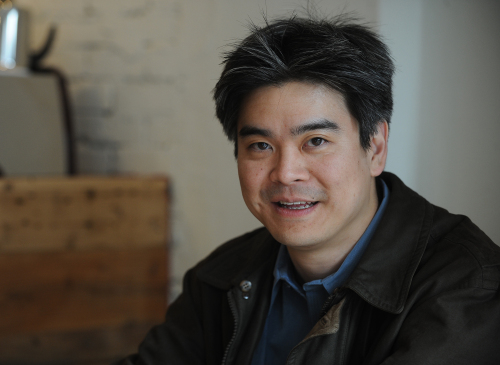Korean-American playwright brings unusual portrait of immigrant family
By Claire LeePublished : April 2, 2012 - 20:29
Lloyd Suh’s drama ‘American Hwangap’ gets its first Seoul run
The concept of home and belonging has been repeatedly discussed in migration studies and art, yet many local viewers may find Korean-American playwright Lloyd Suh’s play quite equivocal and even unusual.
As its title, “American Hwangap” suggests, the play deals with the clash between two different worlds: Korea and America, parents and children, and the past and the future. It deals with an uneasy reunion of an immigrant family, as well as a failed American dream of a man who is still in search of a place to belong at age 60. This is no typical family portrait ― at least not what one would expect to see on popular Korean TV dramas.
The show’s Seoul run is meaningful for this southern Indiana-born playwright, who grew up in a neighborhood where he didn’t get to see many people of Asian descent. The play, which was written and performed in English, has been translated into Korean and is now being staged by local actors and actresses.
The concept of home and belonging has been repeatedly discussed in migration studies and art, yet many local viewers may find Korean-American playwright Lloyd Suh’s play quite equivocal and even unusual.
As its title, “American Hwangap” suggests, the play deals with the clash between two different worlds: Korea and America, parents and children, and the past and the future. It deals with an uneasy reunion of an immigrant family, as well as a failed American dream of a man who is still in search of a place to belong at age 60. This is no typical family portrait ― at least not what one would expect to see on popular Korean TV dramas.
The show’s Seoul run is meaningful for this southern Indiana-born playwright, who grew up in a neighborhood where he didn’t get to see many people of Asian descent. The play, which was written and performed in English, has been translated into Korean and is now being staged by local actors and actresses.

“I think just being instantly identifiable as ‘the other’ and feeling as ‘the other’ all the time had obvious disadvantages (as I was growing up),” said Suh during an interview with The Korea Herald. He was in Korea for five days for the opening of the show’s Seoul run.
“But there were advantages, too, because it made me think, if I’m ‘the other,’ how do I define what it is to be me? I never really felt an impulse to be like everybody else. Because I knew I couldn’t.”
The plot of the play develops as its lead character Jeon min-seok returns to his family ― whom he abandoned 15 years earlier ― in Texas. He had lost his job as an engineer at the time, and it made him feel betrayed by the U.S. which he wanted to believe was his second home. Hence he moved back to Korea by himself, leaving his wife and three children by themselves.
“In west Texas, there were a lot of engineer jobs in the ‘70s and ‘80s,” Suh said. “I think many immigrants at the time took science and technology jobs and had a certain amount of expertise in what they were doing. But because science and technology is such a rapidly growing field that’s constantly innovating and redefining itself, it became a younger person’s game really quickly. So this character Jeon had a lot of bitterness 15 years ago about that and felt like the West and his idea of what the West was were ultimately untrue.”
In the play, Jeon’s three children are obviously still distraught by the separation that took place 15 years ago. His first son, David, has established himself as an accomplished investment banker in New York, but it is clear that he is utterly unhappy. His daughter, Esther suffered two unhappy marriages as well as a stillbirth. Ralph, the youngest of the three, is the most fragile and vulnerable ― he suffers from a neurosis and still longs to prove his worth to his father. The three each responds differently to Jeon’s abrupt return, which coincides with his hwangap, or 60th birthday.
“Most of the people that I know, whether they are Chinese-American, Japanese-American or Filipino-American, they are second generation,” Suh Said. “We are children of immigrants. I think there is something that’s instantly identifiable about that. Being the children of immigrants is about becoming a promise of the sense of diasporic hope. Your parents moved for opportunities and their children are capable of things that they might not even be able to imagine.”
“American Hwangap” runs until April 22 at Guerilla Theater in Daehangno, Seoul. For tickets and information, call (02) 763-1268 or visit www.doyoart.com.
By Claire Lee (dyc@heraldcorp.com)










![[Hello India] Hyundai Motor vows to boost 'clean mobility' in India](http://res.heraldm.com/phpwas/restmb_idxmake.php?idx=644&simg=/content/image/2024/04/25/20240425050672_0.jpg&u=)








